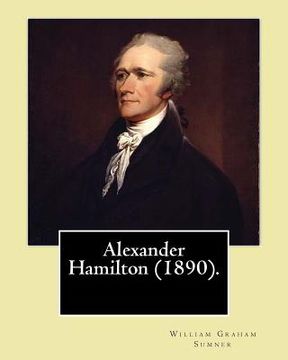Alexander Hamilton (1890). By: William Graham Sumner: Alexander Hamilton (January 11, 1755 or 1757 - July 12, 1804) was an American statesman and one (in English)
Synopsis "Alexander Hamilton (1890). By: William Graham Sumner: Alexander Hamilton (January 11, 1755 or 1757 - July 12, 1804) was an American statesman and one (in English)"
Alexander Hamilton (January 11, 1755 or 1757 - July 12, 1804) was an American statesman and one of the Founding Fathers of the United States. He was an influential interpreter and promoter of the U.S. Constitution, as well as the founder of the nation's financial system, the Federalist Party, the United States Coast Guard, and The New York Post newspaper. As the first Secretary of the Treasury, Hamilton was the main author of the economic policies of the George Washington administration. He took the lead in the funding of the states' debts by the Federal government, as well as the establishment of a national bank, a system of tariffs, and friendly trade relations with Britain. His vision included a strong central government led by a vigorous executive branch, [1]:3-4 a strong commercial economy, with a national bank and support for manufacturing, plus a strong military. This was challenged by Virginia agrarians Thomas Jefferson and James Madison, who formed a rival party, the Democratic-Republican Party. They favored strong states based in rural America and protected by state militias as opposed to a strong national army and navy. They denounced Hamilton as too friendly toward Britain and toward monarchy in general, and too oriented toward cities, business and banking. Hamilton was born out of wedlock in Charlestown, Nevis. His Scottish-born father, James A. Hamilton, was the fourth son of Alexander Hamilton, laird of Grange, Ayrshire.[2] His mother, born Rachel Faucette, was half-British and half-French Huguenot.[1]:8 Orphaned as a child by his mother's death and his father's abandonment, Hamilton was taken in by an older cousin and later by a prosperous merchant family. He was recognized for his intelligence and talent, and sponsored by a group of wealthy local men to travel to New York City to pursue his education. Hamilton attended King's College (now Columbia University), choosing to stay in the Thirteen Colonies to seek his fortune. Discontinuing his studies before graduating when the college closed its doors during British occupation of the city, [3] Hamilton played a major role in the American Revolutionary War. At the start of the war in 1775, he joined a militia company. In early 1776, he raised a provincial artillery company, to which he was appointed captain. He soon became the senior aide to General Washington, the American forces' commander-in-chief. Hamilton was dispatched by Washington on numerous missions to convey plans to his generals. After the war, Hamilton was elected as a representative to the Congress of the Confederation from New York. He resigned to practice law, and founded the Bank of New York........... William Graham Sumner (October 30, 1840 - April 12, 1910) was a classical liberal (now a branch of "libertarianism" in American political philosophy) American social scientist. He taught social sciences at Yale, where he held the nation's first professorship in sociology. He was one of the most influential teachers at Yale or any major schools. Sumner wrote widely within the social sciences, with numerous books and essays on American history, economic history, political theory, sociology, and anthropology. He supported laissez-faire economics, free markets, and the gold standard. He adopted the term "ethnocentrism" to identify the roots of imperialism, which he strongly opposed. He was a spokesman against imperialism and in favor of the "forgotten man" of the middle class, a term he coined. He had a long-term influence on conservatism in the United States. Biography: Sumner wrote an autobiographical sketch for the fourth of the histories of the Class of 1863 Yale College.In 1925, Rev. Harris E. Starr, class of 1910 Yale Department of Theology, published the first full length biography of Sumner. A second full length biography by Bruce Curtis was published in 1981. Other authors have included biographical information about Sumner as shown by citations in this "Biography" section.....

